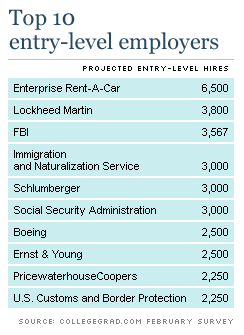NEW YORK (CNN/Money) � The newest crop of college grads will have more job opportunities than last year's graduating class, and in a few cases, slightly higher salaries.
But while analysts characterize the employment outlook as "gradually improving," there's also likely to be a larger pool of applicants chasing the increased number of job openings.
That's because the college labor market was dismal for many seniors over the past few years. So there are grads from the classes of 2001, 2002 and 2003 who are either still unemployed or are dissatisfied in jobs they took because they had to.
"You'll see an incredible amount of competition," said Dr. Phil Gardner, director of the Collegiate Employment Research Institute at Michigan State University.

A quarterly survey released last week by the National Association of Colleges and Employers (NACE) found that employers expected to hire 11.2 percent more college grads than they did last year.
Just over half of the 209 companies that responded to NACE's survey � which are mostly large employers who do the greatest amount of their entry-level job recruiting on college campuses -- said they expected to hire more grads this year, while 29 percent expected to hire fewer.
In terms of regions, the NACE survey projects increases in all four, though to varying degrees. Employers in the Northeast said they expect the biggest increase in college-grad hiring (20.9 percent), while those in the Midwest expect the smallest (2.7 percent).
What say they about payday?
When it comes to starting salaries, it appears there will be a small uptick for some college grads. NACE found that almost 37 percent of employers expect to offer slightly higher salaries to new college grads than they did last year, while close to 60 percent said they expected their offers to be about the same as last year's.
In a separate salary survey released earlier this month, NACE found that information sciences majors are enjoying the biggest pay hike. Their average salary has climbed 10.7 percent to $44,075. Communications majors, meanwhile, are seeing the steepest drop. Their starting salaries are averaging $28,388, a 12 percent decline from last year.

But the averages reported in the NACE survey may be on the high side as a gauge for college seniors who have yet to secure a job offer, Gardner said. "My average students aren't getting those salaries."
That's because the NACE survey only reflects offers made to graduating seniors between September 2003 and mid-March 2004. That's a period when usually only a small percentage of students are hired, typically top students who can command top pay.
What's more, the salaries reported in the NACE survey do not reflect cost-of-living differences. In other words, a $40,000 offer in a low-cost city holds the same weight as a $40,000 offer in a high-cost city.
Some areas better than others
Job opportunities for new grads are more plentiful in some fields than others.
Accounting majors, for instance, always seem to be in demand. "We can't seem to produce enough accounting students," said Velma Arney, director of undergraduate career services at the McCombs School of Business at the University of Texas at Austin.
Seniors with majors in management and information sciences are also enjoying an increase in opportunities, Arney said. She's also seeing more job opportunities in investment banking and strategic consulting than she did last year.
At UT's engineering school, the number of recruiters on campus is up about 18 percent this spring from last spring and 6 percent for the year overall, said Nancy Evans, director of the school's career center.
Evans sees increased opportunities for students across all engineering disciplines, but not equally so. Civil and petroleum engineering majors are likely to do best, she said, while electrical, mechanical and computer engineering majors will have a tougher time.
Gardner also doesn't expect an abundance of opportunities in manufacturing, computer science or professional services (for example, advertising, marketing or public relations).
Mom, Dad: I'm back
Even though the overall employment outlook for college grads is improving, this year's seniors aren't banking on an easy ride.
In a March survey, Monster.com found that 51 percent of seniors didn't expect any job offers upon graduation. And a survey done this spring by Harvard University's Institute of Politics found that 67 percent of all college students believed that it would be somewhat or very difficult to find a job after graduation.
Maybe that's why 57 percent of seniors surveyed by Monster said they planned to move home after graduation.
Still, that's down from 61 percent who planned to do so last year. That's as firm a sign as any, perhaps, that the job market for college grads is improving.

|

